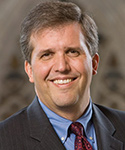Genocide. Terrorism. Cultural and political polarization on the left and the right. Schisms within the Anglican Communion. Worship wars in congregations.
Why do human beings tend to harden their positions in many situations, becoming prone to rigidity, demonizing others and even physical violence? That is the question that animates Harvard Law Professor Cass Sunstein in his new book, “Going to Extremes.” His answer, on one level, is deceptively simple: “When people talk to like-minded others, they tend to amplify their pre-existing views, and to do so in a way that reduces their internal diversity.” To study the theory, Sunstein asked a group to read a case on corporate misconduct and recommend punitive damages. When put in a room to deliberate together, the group recommended awards beyond any one person’s recommendation. The group went to extremes.
Polarization in American culture is worsening, Sunstein says, as we have shifted from a “culture of serendipity” to a “culture of control.” Rather than gathering information from a wide variety of places and being surprised by what we learn, we control the information we access, including the television channels we watch and the groups we join.
Christians can recognize the development of extreme positions as the consequence of sin, but we are not immune from such behavior ourselves. Mainline Protestants caricature evangelicals and vice versa. Protestants caricature Catholics and vice versa. Even worse are the polarizations within denominational families that are then reflected in institutions. Seminaries might be arenas for raising up leaders capable of leading people away from polarizing extremes; but too often we produce partisans better equipped for partisanship than for genuine leadership. Too often we become weaker precisely at the point where we fail to lead.
What would have happened to the Jerusalem Council (Acts 10-15) if the opposing parties, on the question of whether Gentiles needed to be circumcised to be followers of Jesus, had gone the direction of group polarization, rather than struggling together with discernment? Instead, they met in conference, sought discernment through prayer and discussion, and eventually found a path forward. Their decision begins: “For it has seemed good to the Holy Spirit and to us….” The council sought genuine guidance from the Holy Spirit and included diverse viewpoints. The announcement of a decision was not a verbal grenade launched from behind the barricades of one polarized group toward others, but rather the reflection of genuine discernment.
In such a process, transformative leadership matters. Sunstein notes that people are moved toward appreciation -- though not necessarily approval -- of others’ positions not by the arguments of their antagonists, but rather by trusted leaders who help them to engage diverse convictions and opinions constructively and fairly. Abraham Lincoln’s leadership was exemplary in this regard, as was Nelson Mandela’s. So too is the transformative leadership of many pastors and Christian institutional leaders, who embody such commitments in the very character of their day-to-day work: shaping sermons, leading conversations, guiding processes of discernment, appointing people to leadership positions within their institutions. Christians are called to love our enemies, which ought to include finding the spaces and contexts in which we can learn to appreciate, and indeed to love, those from whom we are estranged and even those with whom we disagree.
The solution to group polarization and the tendency to go to extremes is not to engage in weak-kneed compromises or evasive tolerance in which people commit to avoiding each other. Neither is it to become like the church in Laodicea in the Book of Revelation, which was “spewed out” of the Lord’s mouth because it was lukewarm, neither hot nor cold.
If we have a tendency to go to extremes, what if we search for the “extreme center,” for holding ideas in tension rather in opposition to one another? We ought not shy away from strong convictions, and even “extreme” commitments to truth, goodness, beauty, forgiveness, justice and love. At the same time, we long for leaders, and institutions, that genuinely move us forward, embodying Jesus’s call to love our enemies and recognize with humility that whatever our convictions, we “see through a glass, darkly” (1 Corinthians 13:12). We do see; but there are also things we do not yet see.
Too many Christian institutions are preoccupied with survival rather than focused on preparing people to become leaders who can cultivate healthier and more faithful congregations, nurture stronger Christian discipleship and help to shape more life-giving, thriving communities. Paul reminds us that our vocation comes from God, “who reconciled us to himself through Christ, and has given us the ministry of reconciliation.” We are thereby called to be “ambassadors for Christ” (2 Corinthians 5:18, 20). We ought to embody this ambassadorial role not only in our individual lives, but in the character of our communities and institutions. Can we offer a witness in the midst of polarized extremes, mobilizing transformative leaders and vibrant institutions toward the extreme center?









